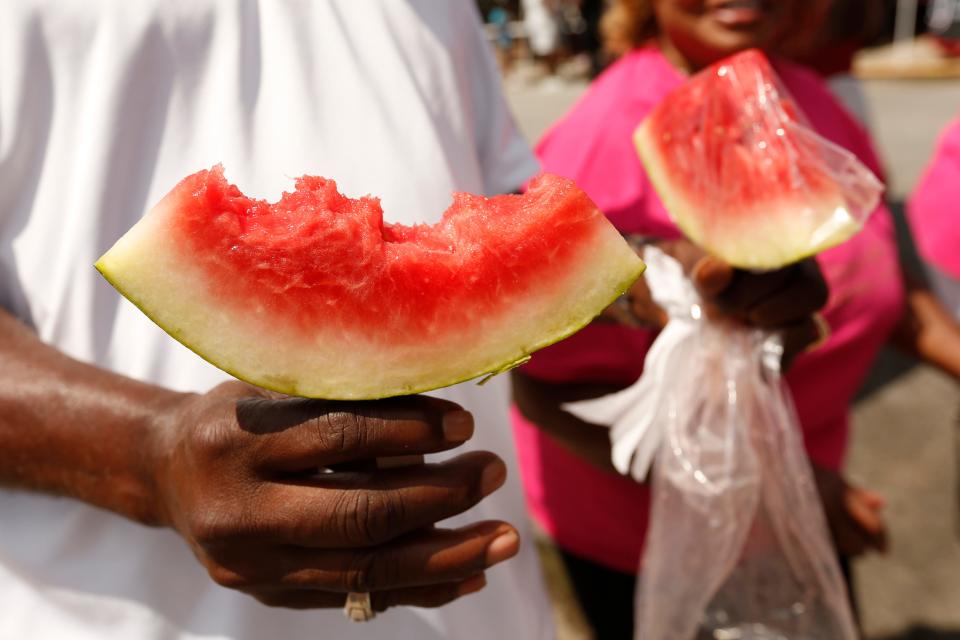Let the seed-spitting begin – it's watermelon time: Campbell Vaughn
It is the midpoint of summer and it is time to celebrate. America, Independence Day, the Fourth, bald eagles, BBQ, swimming pools and don’t forget one of the favorites of the South: watermelons (Citrullus lanatus). It always amazes me that every time someone brings a watermelon to an event, almost every bit of it gets eaten. Kids and adults love the stuff. I do too.
Consumption of watermelons has been rising over the years and, according to the Agriculture Marketing Resource Center, annual per capita consumption of watermelons is over 15 pounds of the delicious juiciness per person. No wonder I am noticing that people devour watermelons every time it is served. Fifteen pounds is a bunch of fruit.

Watermelons are members of the cucurbit family, which makes it a cousin to pumpkins, cantaloupes, cucumbers and squash. First cultivated in Egypt, the fruit was first moved to India and China before arriving in Florida in 1673. With its popularity, watermelons moved throughout the United States over the years and have landed in 90 countries around the world. In the United States, the largest producers of watermelons by state are Florida, Georgia, Texas and California with total production being close to 40 million pounds per year. In Georgia, we are the second largest producer of watermelons in the US with 40,000 acres in production and an annual $140 million value. The largest producing Georgia counties are Crisp, Tift and Turner.
Hot weather lawn care: In extreme heat, how much should you water your lawn? The answer requires math.
Campbell Vaughn: In this excessive heat, drought-tolerant plants will wilt, healthy plants may die
Watermelons grow as a vine and produce both male and female flowers, which means that it needs a source to move pollen from one flower to the other. Honey bees are often moved to watermelon fields to help the native pollinators with the extra work it takes to make more little melon babies. From seeding to harvesting takes between 70 and 90 days.
With hybridization, seedless melons have become the bulk of the production in the watermelon field. Seedless products have been a big boost to the industry but it comes with a little bit of personal sadness. With no seeds, you are really missing some serious fun that goes along with spitting a watermelon seed onto an unsuspecting younger sibling.
Watermelons containing 92% water, so you can understand where this fruit got its name. Watermelon contains Vitamins A, B6, C and B1 as well as antioxidants and amino acids. All parts of a watermelon are edible although I prefer the inside over eating the rind. With no fats or salt, watermelons are a festival of hydration and nutrition.
This week: July 4th celebrations, where to see fireworks, live music and the Loomis Bros Circus
For future subscribers: 7 benefits of being a digital subscriber to The Augusta Chronicle
From Bluffton Today: 80th Watermelon Festival turned out 'amazing,' 'fabulous,' say organizers
Storage of watermelons is simple. If you can keep them below 60 degrees, they will last about two weeks. At room temperature, freshness usually lasts about a week to 10 days.
Speaking of festivals, there are several cities across the United States that boast being the Watermelon Capital of the World, but we Georgians know that the real one is down in Cordele, Georgia. Unfortunately, if you didn’t make last weekend’s Watermelon Days Festival in Crisp County, you will have to wait until next year to sign up for these epic watermelon chunking or seed-spitting contests. I may have to sneak up on my little sister this weekend to practice for next year's contest.
Have a great Independence Day. USA! USA! USA!
Reach Campbell Vaughn, the UGA Agriculture and Natural Resource agent for Richmond County, by e-mailing augusta@uga.edu.
This article originally appeared on Augusta Chronicle: Watermelon trivia: Let the seed-spitting begin

